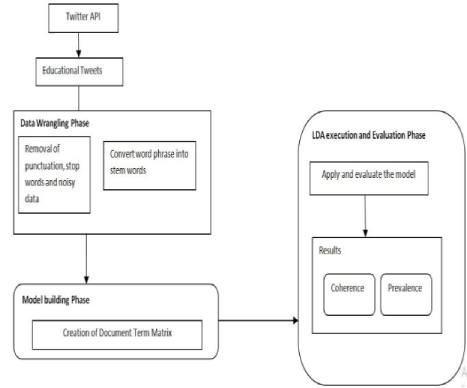Analyzing Educational Tweets using LDA Model
Keywords:
Topic modeling, Latent Dirichlet Allocation, Latent Semantic Analysis, Educational tweetsAbstract
For the purpose of generating best educational reforms, knowledge discovery of educational tweet analysis is more important. Today the social media content on the Internet is rigorously increasing hour by hour. Hence analyzing this textual content is a vital task to solve problems in education. In this study Latent Dirichlet Allocation (LDA) is used to analyze the text content which finds the relationships among documents in the corpus. This proposed work shows that the LDA provide better result to extract topic with accurate coherence & prevalence score. This work also infers that the LDA performs best than Latent Semantic Analysis (LSA).
Downloads
References
Aletras, N., Baldwin and et.al,“Evaluating Topic Representations for Exploring Document Collections”, Journal of the Association for Information Science and Technology, 2015.
Nugroho, R and D. Molla-Aliod et.al, “Incorporating Tweet Relationships into Topic Derivation”, Proceedings of the 2015 Conference of the Pacific Association for Computational Linguistics, PACLING. 2015
Bettina Grun, kurt Hornik ,“topicmodels: An R Package for Fitting Topic Model”, Journal of Statistical Software, 2011, 40(13).
Goel, Vikas, Amit Kr Gupta, and Narendra Kumar, "Sentiment Analysis of Multilingual Twitter Data using Natural Language Processing." 2018 8th International Conference on Communication Systems and Network Technologies (CSNT). IEEE, 2018.
L. Hong and B. D. Davison,”Empirical study of topic modelling in twitter”, In Proceedings of the First Workshop on Social Media
Kumari, S. S. ., and K. S. . Rani. “Big Data Classification of Ultrasound Doppler Scan Images Using a Decision Tree Classifier Based on Maximally Stable Region Feature Points”. International Journal on Recent and Innovation Trends in Computing and Communication, vol. 10, no. 8, Aug. 2022, pp. 76-87, doi:10.17762/ijritcc.v10i8.5679.
Ponweiser, M., Latent Dirichlet Allocation in R. Diploma Thesis Institute for Statistics and Mathematics, 1-138, (2012).
Qi Jing,” Searching for Economic Effects of User Specified Event Based on Topic Modeling and Event Reference”, Jordery School of Computer Science, Acadia University 2015.
David M.Blei , “Probabilistic Topic Models”, Communications of the ACM, 2012, 55(4), 77-84.
David M.Blei and John D. Lafferty, “A Correlated Topic Model of Science”, Annals of Applied Statistics 2006, 1(1), 17-35.
L. Yao, D. Mimno, and A. McCallum, ”Efficient methods for topic model inference on Streaming document collections”, In Proceedings of the 15th ACM SIGKDD international conference on KDD, KDD ’09, 2009, 937–946, NY, USA, ACM.
M. Hoffman, D. Blei, and F. Bach,”Online learning for latent dirichlet allocation”, Advances in Neural Information Processing Systems,2010, 23,856–864.
D. M. Blei, A. Y. Ng, and M. I. Jordan,”Latent dirichlet allocation”,JMLR, 2003, 3, 993–1022.
David Mimno and Hanna M Wallach et.al,” Optimizing semantic coherence in topic models”, In Proceedings of the Conference on Empirical Methods in Natural Language processing, 2011, 262–272. Association for Computational Linguistics.
Li-Qiang Niu and Xin-Yu Dai.”Topic2vec: Learning distributed representations of topics” , 2015 Available at: arXiv preprint arXiv: 1506.08422
Vivek Kumar and Rangarajan Sridhar, ”Unsupervised topic modeling for short texts using Distributed representations of words”, In Proceedings of NAACL-HLT, 2015, 192–20
Siti Qomariyah, Nur Iriawan and Kartika Fithriasari, “Topic modeling Twitter data using Latent Dirichlet Allocation and Latent Semantic Analysis”, AIP Conference Proceedings 2194, 020093 (2019); https://doi.org/10.1063/1.5139825 Published online: 18 December 2019.
Marina Sokolova1, Kanyi Huang1 and Stan Matwin and et.al,” Topic Modeling and Event Identification from Twitter Textual Data”,
G. Bala Krishna Priya 1], Dr. Jabeen Sultana 2. , Prof. M. Usha Rani 3,” A Review to Classify Sentiments Using Some Machine Learning Techniques”, International Journal of Computer Science Trends and Technology (IJCST), 2021, 9(4), 18-22.
Garg, D. K. . (2022). Understanding the Purpose of Object Detection, Models to Detect Objects, Application Use and Benefits. International Journal on Future Revolution in Computer Science &Amp; Communication Engineering, 8(2), 01–04. https://doi.org/10.17762/ijfrcsce.v8i2.2066
Jabeen Sultana, M. Usha Rani and M.A.H. Farquad,” Knowledge Discovery from Recommender Systems using Deep Learning”, 2019 International Conference on Smart Systems and Inventive Technology (ICSSIT), 1074-1078. IEEE.
Kose, O., & Oktay, T. (2022). Hexarotor Yaw Flight Control with SPSA, PID Algorithm and Morphing. International Journal of Intelligent Systems and Applications in Engineering, 10(2), 216–221. Retrieved from https://ijisae.org/index.php/IJISAE/article/view/1879
Christan Grant, Clint P. George, Chris Jenneisch,” Online Topic Modeling for Real-time Twitter Search”.

Downloads
Published
How to Cite
Issue
Section
License

This work is licensed under a Creative Commons Attribution-ShareAlike 4.0 International License.
All papers should be submitted electronically. All submitted manuscripts must be original work that is not under submission at another journal or under consideration for publication in another form, such as a monograph or chapter of a book. Authors of submitted papers are obligated not to submit their paper for publication elsewhere until an editorial decision is rendered on their submission. Further, authors of accepted papers are prohibited from publishing the results in other publications that appear before the paper is published in the Journal unless they receive approval for doing so from the Editor-In-Chief.
IJISAE open access articles are licensed under a Creative Commons Attribution-ShareAlike 4.0 International License. This license lets the audience to give appropriate credit, provide a link to the license, and indicate if changes were made and if they remix, transform, or build upon the material, they must distribute contributions under the same license as the original.





